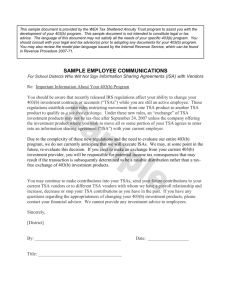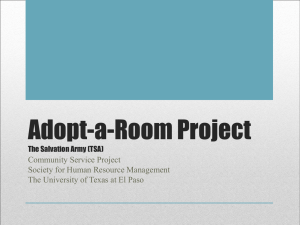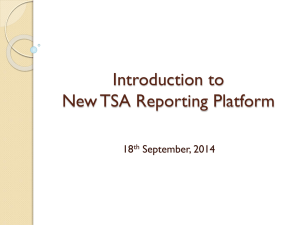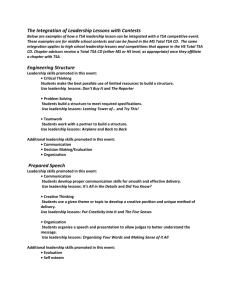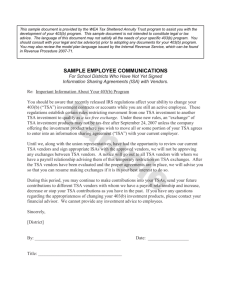Testing / Services Agreement (TSA) Activities Guidelines
advertisement
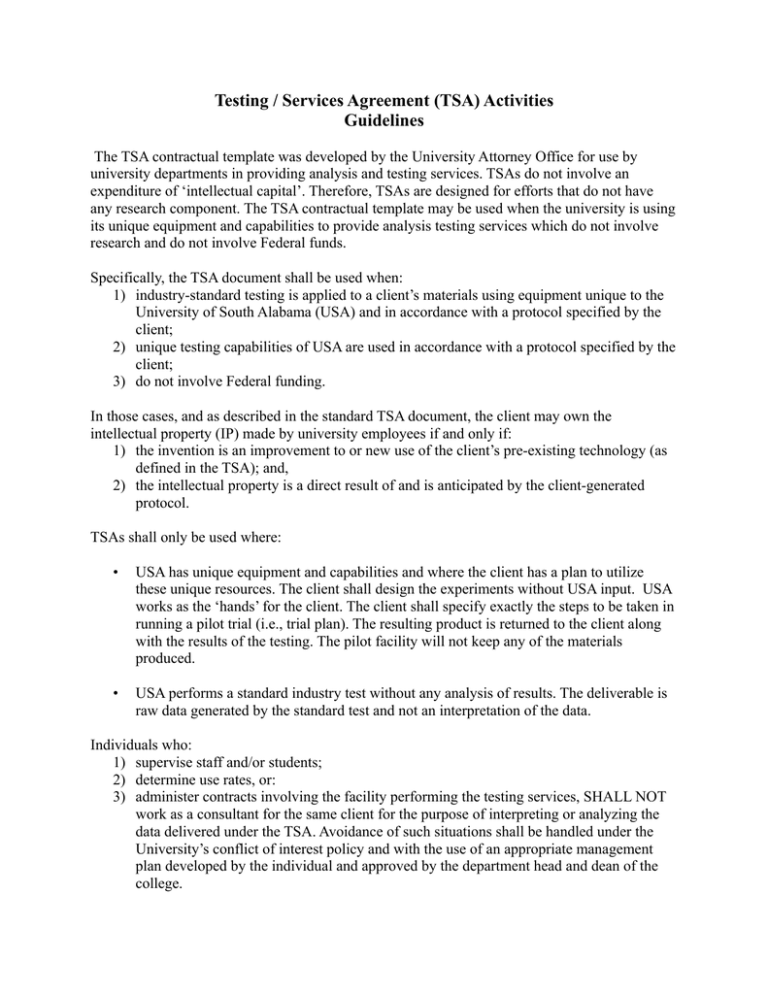
Testing / Services Agreement (TSA) Activities Guidelines The TSA contractual template was developed by the University Attorney Office for use by university departments in providing analysis and testing services. TSAs do not involve an expenditure of ‘intellectual capital’. Therefore, TSAs are designed for efforts that do not have any research component. The TSA contractual template may be used when the university is using its unique equipment and capabilities to provide analysis testing services which do not involve research and do not involve Federal funds. Specifically, the TSA document shall be used when: 1) industry-standard testing is applied to a client’s materials using equipment unique to the University of South Alabama (USA) and in accordance with a protocol specified by the client; 2) unique testing capabilities of USA are used in accordance with a protocol specified by the client; 3) do not involve Federal funding. In those cases, and as described in the standard TSA document, the client may own the intellectual property (IP) made by university employees if and only if: 1) the invention is an improvement to or new use of the client’s pre-existing technology (as defined in the TSA); and, 2) the intellectual property is a direct result of and is anticipated by the client-generated protocol. TSAs shall only be used where: • USA has unique equipment and capabilities and where the client has a plan to utilize these unique resources. The client shall design the experiments without USA input. USA works as the ‘hands’ for the client. The client shall specify exactly the steps to be taken in running a pilot trial (i.e., trial plan). The resulting product is returned to the client along with the results of the testing. The pilot facility will not keep any of the materials produced. • USA performs a standard industry test without any analysis of results. The deliverable is raw data generated by the standard test and not an interpretation of the data. Individuals who: 1) supervise staff and/or students; 2) determine use rates, or: 3) administer contracts involving the facility performing the testing services, SHALL NOT work as a consultant for the same client for the purpose of interpreting or analyzing the data delivered under the TSA. Avoidance of such situations shall be handled under the University’s conflict of interest policy and with the use of an appropriate management plan developed by the individual and approved by the department head and dean of the college. All work SHALL be done by trained university personnel and not by the client. The client may be present and observe and supervise the testing when necessary. Under no circumstances shall the client’s personnel be involved in running any equipment. While on premises, both the client and client’s personnel shall cooperate and adhere to university safety practices, including the wearing of personal protective equipment where required. Procedures: The following procedures must be observed in all department / labs in any university college that engages in TSA activities: 1) All processing of TSAs is handled through the Project Coordinator and shall include a valid statement of work (SOW) as ‘Attachment A’ that follows the guidelines specified above. 2) It is required that the standard language of the TSA contractual template not be changed. The language is neither onerous nor burdensome for a public institution like USA. In the event that the client requests modifications to the TSA template, such modifications must be approved, in advance, by USA. Any modifications to the TSA template must be acceptable and approved by the University Attorney Office. USA’s ability to accept modifications to the TSA template is very limited, and discussions with a potential client should include that information. 3) Work SHALL NOT begin unless a TSA document has been signed off by the University Contract Officer. 4) A valid and current facility use rate SHALL be in place before a TSA is executed. All facility use rates shall be reviewed and renewed annually by Project Coordinator and the Office of Grants and Contracts 5) The revenues generated by the project shall be used for the upgrade of the facility, repairs to the facility, and salaries of the personnel in that lab. 6) In the case of personnel paid from University accounts, the University account shall be reimbursed the amount of the applicable salaries from revenues generated. Routing: a) Using the most current TSA contractual template, the Project Coordinator prepares the TSA, and the appropriate statement of work is provided as ‘Attachment A’. b) The Project Coordinator forwards the TSA to the sponsor for signature. c) The Project Coordinator forwards the signed TSA to the University Contract Officer for signature. d) The Project Coordinator contacts the Business Office to arrange for an account establishment. e) If the sponsor makes any change to the TSA, the Project Coordinator must route the TSA to the University Attorney Office for negotiation.
